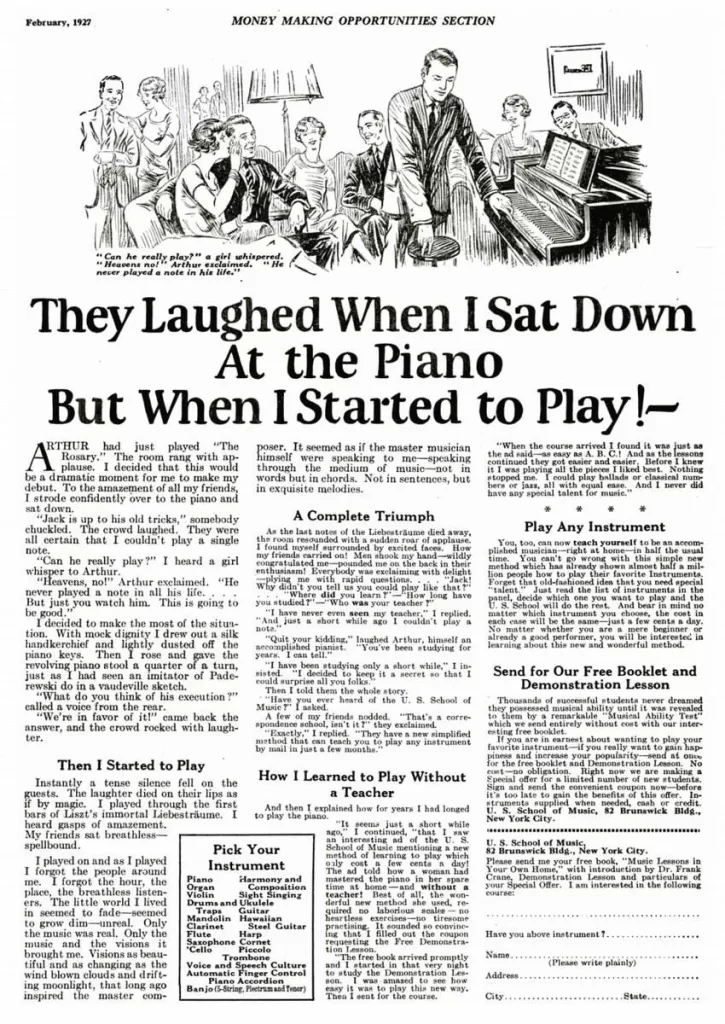Would you mind if I were negative for a moment?
As a matter of fact, you might get upset when I tell you this. But…
Over the last 20 years, copywriting has changed drastically. No longer is it just for “insiders” who write ads and commercials for big publications and agencies. Now, it’s anyone’s game.
Or is it?
Actually, no, it is not.
You’ve Taken Copywriting Courses and You Are Still Broke
We’ve seen a rise in copywriting course purveyors who will convince you that if you take their course, you’ll become a professional copywriter.
Well, it’s true that anyone can do it, but…
Anyone can open a pizza restaurant, but not everyone will be successful at it.
Just about anyone can learn karate, but not everyone will become a black belt.
Anyone can study and even practice copywriting, but not everyone will become a successful freelancer.
And there are many reasons why this is so.
One of the key reasons why many people fail at becoming professional-level copywriters is because they are unfocused. In other words, they don’t have a clue where they are going.
As I mentioned earlier, copywriting has changed drastically, and you have so many options open to you that you must determine what kind of copywriter you want to become.
And the sooner you figure that out, the greater the chances that you’ll be a successful copywriter.
So, keep reading, and I’ll show you how to figure out which direction you need to go in order to become a successful copywriter.

What Kind of Copywriter Do You Want to Be?
The information age is a beautiful yet daunting era.
What do I mean by that?
There are countless opportunities for copywriters, which is both exciting and overwhelming. However, I’ve seen new copywriters who resemble dogs chasing cars on a freeway.
With so many options, they don’t know what to pursue. And we all know what happens to dogs on a freeway, right?
The Two Types of Copywriting You Need to Know About
Before diving into niches, it’s essential to understand the two main types of copywriting: content copywriting and direct response copywriting.
This distinction can be a bit blurry, so let me clarify with a personal story.
A long time ago, I was a trombonist in the Headquarters Army Band in Europe. I was responsible for writing, designing, and editing program notes for many of our concerts.
This was copy that had to be professionally written for public performances. It was informational content handed out to attendees at the concerts.
Later on, in civilian life, I wrote and designed pamphlets and websites for businesses. This type of content writing is often considered copywriting by many people.
Eventually, I designed a simple tool for the U.S. Army and sold it worldwide.
I wrote a sales letter based on a template from the famous copywriter, Dan Kennedy. In that letter, I urged readers to call immediately to get a free sample of our product.
My wife and I made a lot of money from that sales letter, marking it my first experience with direct response copywriting.
The most fundamental difference between these two types of writing is that one provides information supporting products and services, while the other (direct response) aims to sell the product or service.
Direct response copy includes a call to action and a way for the reader to respond to the offer presented.
Why The Copywriting Line is Blurry with These Two Classes
Many skilled direct response copywriters don’t believe that the term “copywriting” applies to content writers. Conversely, many content writers think that content marketing is closely related to direct response copywriting.
In my opinion, both can be considered copywriting, which is why I’m discussing both of them.
But here’s the thing: Every professional-level content marketer I’ve known started by learning direct response copywriting.
In fact, blogging, email marketing, video scripts, and other online channels evolved from direct response ads that ran in magazines before the first home computer.
The reason the line between copywriting and content marketing is so blurry is that back in the days of printed materials, the best copywriters seamlessly used both styles.
Yep.
Look at a John Caples or a David Ogilvy ad, and you’ll swear you’re reading an article, not a direct response advertisement.

What is a Niche and Why is it so Important?
I know I’m going over fundamentals here, but if you’re going to be a copywriter, you’ll need to determine what arena you’ll be fighting in.
I remember years ago, I was watching a Dan Kennedy seminar on how to get copywriting clients, and he was evaluating ads that copywriters were using in a trade publication to get clients.
About 50% of them were what he called “vanilla.”
In other words, they were generalists; people who were not specializing in anything.
Now, bear in mind that these are professional copywriters who were spending money on ads, and they were missing the fundamental idea of claiming a niche to operate in.
Man, was Kennedy making fun of these people.
Definition of “Niche”
A niche, in the context of copywriting, refers to a specialized area or segment within a broader field.
Imagine you’re at a party full of people and two of them are talking.
One of them is a fitness coach and the other is a public relations guy with a big company.
The coach says to the PR guy, “Man, I’ve got a big client list and I have no clue how to use it. I know that it would help me retain more clients, but I’m too busy to deal with it.”
The PR guy responds, “Oh, that’s easy to fix. Use email marketing, because you can stay in touch with all your clients every day if you want. I use it at my job, and our company’s clients hear from us three times a week!”
But the coach looks confused and replies, “Yeah, but I have no idea how to write and send emails. I’m too overloaded with work as it is, and I have no clue what to write about.”
That’s when the PR guy points across the room and says, “You see that lady over there in the blue dress? She’s an email copywriter who is an expert at helping people who have coaching businesses. Come on, I’ll introduce you to her.”
That’s the position you want to be in: an expert in a particular field of copywriting who helps a specific type of client.

The Benefits of Claiming a Copywriting Niche
Not only is having a copywriting niche important for making you stand out in the marketplace, but it will also make your life so much easier.
What do I mean by that?
Keep reading…
Reason #1: Expertise
If you specialize in a particular niche, you’ll become very familiar with it. This will help you write better, faster, and more confidently than if you were a generalist. You’ll have a deeper understanding of how your market works and what your target audience is thinking.
This understanding will shine through almost automatically in your copy because it will become second nature.
It will seem like you are working less because you won’t have to think about the process so much.
Reason #2: Audience Connection
Because you’re writing for a specific audience, you won’t have to study them as much anymore. Copywriting niches allow you to connect with your audience on a much deeper level.
You’ll know and understand the people you are writing for, and your language will be tailored to them. Your writing will resonate with the interests of the target market, making them think, “Hey, this writer gets me!”
Reason #3: Client Attraction
Remember the scenario I mentioned earlier about a fitness coach meeting an email copywriter? This shows how being in a niche can help you attract the right clients.
When you focus on a specific niche, you become a specialist rather than a generic writer. Here are some examples:
- UX copywriter for airline companies
- Ghostwriter for celebrity psychologists
- Content marketer for robotics startups
- Direct response copywriter for video sales letters
- Real estate copywriter for multi-million dollar listings and auctions
- Beauty and fashion copywriter for skincare and beauty products on social media
See how specific this can get?
You don’t have to work in just one niche. I suggest picking about three that are closely related. It will be much easier to get jobs in these niches when you can speak their language and have portfolio pieces to back up your claims.
Reason #4: Less Competition
Believe it or not, there are two dental surgeons in the world who are extremely wealthy. Both are skilled dentists who specialize in a specific area of dentistry: reattaching teeth to the jaws of their patients.
Because of their specialization, they are in high demand and can charge premium prices for their services.
So, the more specialized you are in a particular niche, the better off you’ll be.

Bonus: Which Copywriting Niches Pay the Most?
Top-paying copywriting niches can be debated, but here are some of the highest contenders:
- Technology and Software: This includes areas like SaaS, AI, and virtual reality.
- Medical and Healthcare: Medical copywriting is highly specialized and requires a deep understanding of medical terminology and concepts, making it a lucrative niche.
- Finance and Personal Wealth: Copywriting for financial services, investment firms, and personal finance blogs can be very profitable.
- Legal: Legal copywriting requires a strong grasp of legal language and concepts, and it is another high-paying copywriting niche.
- E-commerce: With the rise of online shopping, e-commerce brands are willing to pay well for effective product descriptions and sales copy.
- Alternative Health & Wellness: This niche is growing rapidly and offers good pay for copywriters who can create compelling content.
Reason #5: Brand Building
Once you have your niche in place, it becomes a part of your personal brand. When people think of a copywriter who can write sales pages for tech products, they’ll think of you.
If you’ve worked with them before and maintained an excellent reputation in that industry, they’ll reach out to you instead of you having to prospect them.
So, there are the reasons why you should claim a copywriting niche.
However, don’t despair if the task of doing this seems a little daunting.
In the next section of this piece, we’re going to look at a self-analysis process to help you decide on which niche you have to itch. (Ha-ha! A little humor there!)
How to Uncover Your Ideal Copywriting Niche
I know you’re eager to land your first copywriting clients, but before you start, take a moment to reflect on your aspirations, strengths, and interests.
You’ll be working in this niche for quite some time unless you decide to switch to another one.
The point is, if you truly enjoy the field you’re writing in, your work will shine! It won’t feel like a chore to sit down and write because you’ll love your work so much that the hours will fly by.
So, let’s take some time to reflect on your interests, strengths, and aspirations. You want to find an area of expertise that you’ll love and can’t wait to work in.

Self-Reflection for Discovering Your Copywriting Niche
Grab a pad of paper and a pen, and start listing your ideas. You need to pull these gems out of your mind and put them on paper.
Bonus Tip: Carry the pad and pen around with you for several days. This way, when an idea about your interests comes to mind, you can jot it down. You won’t believe the ideas that will flow from your subconscious mind at unexpected times.
Your self-reflection journey begins with four specific categories:
Interests – What Genuinely Excites You?
- What do you like reading about?
- What keeps you up at night?
-
List any hobbies you are passionate about.
Skills – Assess Your Existing Skills
Make a list of any education or skills you’ve acquired.
- Do you have any textbooks on your shelves?
- Take a look at your college transcripts.
- Write down anything that looks like a skill (e.g., Microsoft Excel, lawnmower repair, playing an instrument).
Experience – Consider Any Relatable Experiences You’ve Had in The Past
- Take a look at your resume, if you have one.
- Make a list of anything you’ve accomplished.
- Consider trips, recreation, part-time jobs, or small businesses you’ve started.
Audience – Think About the People You’d Love to Connect With
- Where do they hang out?
- What do they love to do?
- What kind of education do they have?
- What are their occupations?
Bear in mind that these are just ideas to get you started.
If you get stuck, don’t worry. There are all kinds of online assessments you can take if you want to dive deeper into self-assessment.

Market Research: Unearthing Gold in Copywriting
Thanks to the vast expanse of the Internet, copywriters now have many options to explore.
It’s both exhilarating and a bit like a good news/bad news joke.
On one hand, there’s an abundance of opportunities to write for various markets.
On the other hand, the sheer diversity of options can make finding the right ones feel like searching for a needle in a haystack.
Fear not! Effective market research is your compass in this wild frontier.
By understanding emerging trends and identifying lucrative opportunities, you’ll be well-equipped to take action. So, let’s roll up our sleeves and get started.
Define Your Copywriting Niche
Before you embark on your research journey, pinpoint your niche.
What specific area excites you? Is it health and wellness, technology, personal development, or perhaps something entirely unique? Knowing your niche will help you focus your efforts and tailor your approach.
Explore Industry Trends
Stay curious! Regularly explore industry blogs, news sites, and social media platforms. Look for patterns, shifts, and emerging themes.
- What topics are gaining traction?
- Which industries are experiencing growth?
Analyze Competitors
Spy on your friendly neighborhood competitors.
- Study their websites, content, and client base.
- What are they doing right?
- What gaps can you fill?
- Learn from their successes and shortcomings.
Dive into Forums and Communities
Online forums and communities are treasure troves of insights. Join relevant groups—whether on LinkedIn, Reddit, or specialized platforms.
- Engage in conversations.
- Ask questions.
- Observe pain points.
Attend Webinars and Conferences
Virtual events are everywhere.
Attend:
- webinars
- online conferences
- workshops
Not only will you gain knowledge, but you’ll also connect with industry experts and potential clients. Plus, you’ll get to wear your fanciest pajamas.
Leverage Keyword Research
Fire up your favorite keyword research tools. Identify high-traffic keywords related to your copywriting niche.
These keywords will guide your content creation and help you align with what people are actively searching for.
Client Persona Detective Work
Create detailed client personas.
- Who are your dream clients?
- What keeps them up at night?
- What solutions do they seek?
- Understand their pain points, desires, and motivations.
Then tailor your pitch accordingly.
Network Like a Pro
Networking isn’t just for extroverts. Attend some of these venues:
- Virtual networking events.
- Connect on LinkedIn, and build relationships.
Remember, people hire people they know and trust. Be genuine, and the gold nuggets will follow.
Monitor Social Media
Social media isn’t just for cat memes (although those are essential too). Follow these individuals to gain valuable insights:
- Influencers
- Industry leaders
- Potential clients
Engage with their content, share your expertise, and subtly slide into their DMs (professionally, of course).
Stay Agile
Market dynamics shift fast so be agile and learn to adapt.
If a new trend emerges, explore it. If an opportunity knocks, open the door. Flexibility is your secret weapon.
Take Your Time and Choose Wisely
If you take the time to follow the steps above, you’ll be well on your way to uncovering your copywriting niche.
Remember, your field or specialization isn’t set in stone; you can work in more than one niche, but don’t stretch yourself too thin. You don’t want to fall into the trap of being a generalist.
Conclusion
Now it’s time for the rubber to meet the road.
Take your time and go back through this material and consider all of your talents and options.
As I mentioned earlier, keep a pad of paper and a pen handy and make all kinds of notes.
Once you find a niche or two, don’t feel like you have to marry it. Most professional copywriters go through several iterations in their careers before landing on a copywriting niche.
As a matter of fact, I know of two top copywriters who drifted from penning direct response copy into writing for motion pictures.
Please Leave a Comment
I hope this advice will help you uncover your area of expertise to write in. If you get stuck or need further clarification, please take a few moments and let me know in the comment box below.
It would really make my day.

Quite and interesting piece with a load of information.
Thanks!
Ijae, my friend, thank you so very much! What was it that you liked about it? I hope it was helpful to you. God bless!
For a newbie, the information contained in this writeup is quite interesting and got me thinking on the right part especially the bit on finding one’s niche. I am new to this and haven’t even written my first copy just reading up on what I should know and learn first. I know I got a flair for writing, but this is an entirely different game. Writing to promote sales is different. So I need to start on the right footing. That’s why I am reading to learn, first
Ijae, If you want to get a good start at copywriting, check our these posts:
1. https://elmocopy.com/learn-copywriting-free-start-your-copywriting-career/
2. https://elmocopy.com/learn-copywriting-without-going-broke/
3. https://elmocopy.com/learn-copywriting-6-cheap-ways/
4. https://elmocopy.com/learn-copywriting-learning-methods-make-money-writing/
Those should help you. If you need any more advice you can always email me: elmo033057(at symbol)gmail.com
Wow! So far, this is one of the best articles I have read about picking a niche!
Most coaches just list top niches and then have their students pick anyone. They make picking a niche all about “where the big money is,” but in reality, if you don’t love that niche, you won’t go far.
I was one of those copywriters taking advice from these gurus who say we should go broad, and as a result I struggled to land clients at all. So recently I began to stop listening to all these guys and started focusing on a niche I love, which is the trading industry (wealthy & investing). Right now I feel so pumped up to work and excited to help these people! I am glad you also made a major emphasis on specialising as a copywriter.
Astro, my friend, I’m so happy to hear that you liked my post on picking a niche. Well, there are two trains of thought about this. Most of the professional copywriters I know say to pick a niche and stick with it. However, I’ve also read some articles by top dog copywriters that said it is good to be a generalist. My idol in the marketing realm is Dan Kennedy. Dan can write for just about any niche well, but for a long time he specialized in writing for chiropractors. As a matter of fact, he would attend their conventions and speak at them about how to market their practices. He got so well known by the industry that they affectionately called him, “Dr. Dan”. So, if you are having a hard time getting clients in a particular niche, go to two or three RELATED niches. For example, I’m trying to write for executive coaches, but if I can’t reel in enough of them I can slide back into writing for military minded coaches like Jacko Willink. So anything in the coaching business would be fair game. The idea behind this method is you may find something you really like to write for that is more profitable. So, there are no hard and fast rules behind this niche selection. However the sooner you can focus on one or two niches the better. You will become the go-to person for that industry and you won’t have to be an expert in every field. It will also save you a ton of money trying to market to every kind of niche there is. Astro, I’m so happy you commented on my site. If you can, please share this post with others, it would really blow my mind! God bless!
Hello Mark Actually It’s very wonderful and great tips I have got tons and tons of Copywriting Exercises thanks again😁